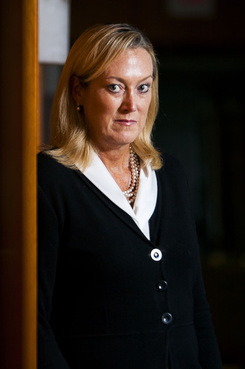Chadbourne Turns Over Sensitive Firm Documents in Sex Bias Case
Plaintiffs in a $100 million gender bias case against Chadbourne and merger partner Norton Rose Fulbright still aren't satisfied with what the firm has produced.
October 23, 2017 at 05:27 PM
5 minute read
 Chadbourne & Parke offices in Washington, D.C.
Chadbourne & Parke offices in Washington, D.C.
Photo: Diego M. Radzinschi
Defunct law firm Chadbourne & Parke, trudging through discovery in a $100 million sex discrimination suit filed by three former partners, is handing over some of its most sensitive and confidential documents, including partner compensation information and the internal communications of the firm's management committee.
The plaintiffs say it's still not enough. They are asking a judge to order Chadbourne to submit more information to fully identify the scope of individual guarantees or other individually negotiated agreements used to pay partners before the firm was absorbed by Norton Rose Fulbright.
Meanwhile, a fourth potential plaintiff could enter the case, potentially giving the plaintiffs more leverage to reach a settlement. “An additional former Chadbourne partner” has recently come forward and is seeking to join the case, and if the parties can't “reach prompt resolution,” the plaintiffs will seek to add her, plaintiffs attorney David Sanford said in a letter Friday.
 Kerrie Campbell
Kerrie CampbellPhoto: Diego M. Radzinschi
The proposed class action, filed more than a year ago, is being led by former partner Kerrie Campbell and two other former Chadbourne partners—Mary Yelenick, now of counsel at merger partner Norton Rose Fulbright, and former Kiev, Ukraine, office leader Jaroslawa Zelinsky Johnson.
They claim Chadbourne was run as an ”all-male dictatorship” that paid women partners less and made its decisions about firm partners in a black box, generally without input or scrutiny from the partnership at large.
This summer, U.S. District Judge J. Paul Oetken in Manhattan shot down competing motions and ordered limited discovery to determine if the three deserve protection under employment laws, or if their former status as partial owners of the firm disqualifies them from bringing the suit.
After a discovery dispute, Magistrate Judge Barbara Moses last week ordered Chadbourne to hand over to the plaintiffs communications between the firm's management committee members about whether a partner can influence the management of the firm and about potential modifications to the partnership agreement.
The judge further ordered Chadbourne to produce management communications about whether to provide information to the general partnership, and about the decision to withhold from the partnership certain information about potential mergers, office closings, and office openings.
Finally, the judge ordered Chadbourne to produce management committee documents related to the methodology to determine partner compensation and to adjust partner profit shares from year to year.
“We are pleased with the judge's order, which compels Chadbourne to produce various categories of documents that plaintiffs expect will show the lack of influence that rank and file Chadbourne partners had and will further show the management committee's overarching control over the firm,” said plaintiffs attorney Alexandra Harwin of Sanford Heisler Sharp in an interview.
More Disclosure
Each year, Chadbourne partners received a “points list” showing the percentage points of firm ownership allocated to them and all other partners of the firm for the coming year, according to a letter from the parties on Friday. The points list also showed which partners were paid under individual guarantees.
Chadbourne said it has produced the point lists that governed compensation during the relevant time as well as copies of offer letters sent to lateral partners, which include information on guarantees.
In addition, Chadbourne, represented by Proskauer Rose partner Kathleen McKenna, said it has produced documents showing which partners were compensated under individual guarantees and it has agreed to produce documents showing the total dollar amount of the profits distributed to each partner.
But the plaintiffs argue the firm's documents don't go far enough. Sanford, the plaintiffs' attorney, said in a Friday letter that the points lists do not name all of the partners who are subject to guarantees and do not all identify, for various partners, the actual dollar amounts paid under the guarantees.
Additionally, Sanford argues, the points lists that Chadbourne originally produced only showed the number of points assigned to partners. Nowhere did they disclose the total dollar amount actually paid to each partner, Sanford said.
Chadbourne, in response, said such information “goes well beyond” the inquiries posed by the court.
Moses, who has reserved decision on a portion of discovery requests, has asked the parties to submit a sample copy of a points list, to be sealed in court.
“The documentation we're seeking is important in confirming that Chadbourne's rank and file partners did not engage in 'profit sharing' and instead received salaries set by the management's committee,” Harwin said in an interview.
In a separate letter about Chadbourne's discovery, the firm said it has processed 2.5 terabytes, or 2,500 gigabytes to create a searchable population of documents, totaling over 4 million records.
A trial in the case would likely not occur until late 2018 or 2019, if the parties don't reach a resolution before then. “The court urged the parties to try to resolve matters in connection with the possible addition of a fourth plaintiff, and plaintiffs are in communications with defendants in an attempt to do so,” Harwin said.
Chadbourne's merger partner, Norton Rose Fulbright, which was added to the case earlier this year, is scheduled to respond to the suit by Nov. 9. Norton Rose Fulbright is represented by a separate counsel, Sidley Austin partner Steven Bierman.
Bierman and McKenna, Chadbourne's attorney, did not respond to emails seeking comment.
This content has been archived. It is available through our partners, LexisNexis® and Bloomberg Law.
To view this content, please continue to their sites.
Not a Lexis Subscriber?
Subscribe Now
Not a Bloomberg Law Subscriber?
Subscribe Now
NOT FOR REPRINT
© 2025 ALM Global, LLC, All Rights Reserved. Request academic re-use from www.copyright.com. All other uses, submit a request to [email protected]. For more information visit Asset & Logo Licensing.
You Might Like
View All
Dechert Sues Former Attorney for Not Returning Compensation

'So Many Firms' Have Yet to Announce Associate Bonuses, Underlining Big Law's Uneven Approach
5 minute read
Topping Big Law, Litigation Firm the Latest to Dole Out Above-Market Bonuses
3 minute readTrending Stories
- 1Retention, Development and 'Empowering Teams': This Am Law 200 Firm's Newest Practice Leader Says Objectives Haven't Changed
- 2From Laggards to Tech Founders: Law Firm Innovation Is Flourishing
- 3Judge Receives Supreme Court Reprimand: 'Your Behavior Was Unacceptable'
- 4Contracts Game Changer? One-Sided ADR Provision Overturned
- 5Attorney Says Seeking Justice for Inmate's Death Requires Systemic Change as Well as Compensation
Who Got The Work
J. Brugh Lower of Gibbons has entered an appearance for industrial equipment supplier Devco Corporation in a pending trademark infringement lawsuit. The suit, accusing the defendant of selling knock-off Graco products, was filed Dec. 18 in New Jersey District Court by Rivkin Radler on behalf of Graco Inc. and Graco Minnesota. The case, assigned to U.S. District Judge Zahid N. Quraishi, is 3:24-cv-11294, Graco Inc. et al v. Devco Corporation.
Who Got The Work
Rebecca Maller-Stein and Kent A. Yalowitz of Arnold & Porter Kaye Scholer have entered their appearances for Hanaco Venture Capital and its executives, Lior Prosor and David Frankel, in a pending securities lawsuit. The action, filed on Dec. 24 in New York Southern District Court by Zell, Aron & Co. on behalf of Goldeneye Advisors, accuses the defendants of negligently and fraudulently managing the plaintiff's $1 million investment. The case, assigned to U.S. District Judge Vernon S. Broderick, is 1:24-cv-09918, Goldeneye Advisors, LLC v. Hanaco Venture Capital, Ltd. et al.
Who Got The Work
Attorneys from A&O Shearman has stepped in as defense counsel for Toronto-Dominion Bank and other defendants in a pending securities class action. The suit, filed Dec. 11 in New York Southern District Court by Bleichmar Fonti & Auld, accuses the defendants of concealing the bank's 'pervasive' deficiencies in regards to its compliance with the Bank Secrecy Act and the quality of its anti-money laundering controls. The case, assigned to U.S. District Judge Arun Subramanian, is 1:24-cv-09445, Gonzalez v. The Toronto-Dominion Bank et al.
Who Got The Work
Crown Castle International, a Pennsylvania company providing shared communications infrastructure, has turned to Luke D. Wolf of Gordon Rees Scully Mansukhani to fend off a pending breach-of-contract lawsuit. The court action, filed Nov. 25 in Michigan Eastern District Court by Hooper Hathaway PC on behalf of The Town Residences LLC, accuses Crown Castle of failing to transfer approximately $30,000 in utility payments from T-Mobile in breach of a roof-top lease and assignment agreement. The case, assigned to U.S. District Judge Susan K. Declercq, is 2:24-cv-13131, The Town Residences LLC v. T-Mobile US, Inc. et al.
Who Got The Work
Wilfred P. Coronato and Daniel M. Schwartz of McCarter & English have stepped in as defense counsel to Electrolux Home Products Inc. in a pending product liability lawsuit. The court action, filed Nov. 26 in New York Eastern District Court by Poulos Lopiccolo PC and Nagel Rice LLP on behalf of David Stern, alleges that the defendant's refrigerators’ drawers and shelving repeatedly break and fall apart within months after purchase. The case, assigned to U.S. District Judge Joan M. Azrack, is 2:24-cv-08204, Stern v. Electrolux Home Products, Inc.
Featured Firms
Law Offices of Gary Martin Hays & Associates, P.C.
(470) 294-1674
Law Offices of Mark E. Salomone
(857) 444-6468
Smith & Hassler
(713) 739-1250







